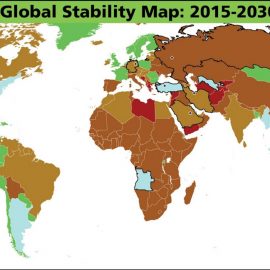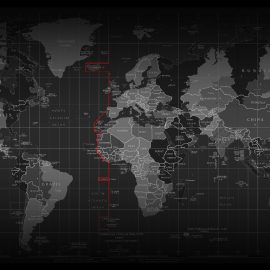Not really talking about writing or fiction on the stream this month. A lot’s going on in the world, and since social media seems to be the predominant source of information for a lot of people, the perception is generally wrong, dumb, inflammatory, or a combination of all three. We’re going to address some of it. War, geopolitics, propaganda, Iraq, Afghanistan, Russia, Ukraine, Mexico… It’s all on the table tonight. Buckle up. We’ll be on YouTube, Rumble, and Twitter/X.
Setting the Stage: Peter Zeihan on Economics and Demographics

This video came across my radar a week or so ago. It’s a long listen, but well worth it. Dr. Peter Zeihan goes into some of the economics and demographics of the collapse of the post-war world order. Some of these trends have gone into the background to the Maelstrom Rising series already. Zeihan’s talk has further fleshed some of them out. Now, I don’t necessarily agree with his entire forecast. I think he’s overlooking a number of, shall we say, violent variables. His outlook is almost entirely economic and demographic, leaving aside some of the potential impacts of violent ideology, desperation politics, terrorism, and “hybrid” Fourth Generation Warfare. Many of these variables have the potential to derail the economics he’s talking about. The demographics can also lead into some of these problems. As was mentioned in a discussion of this video, the solution to demographic problems has occasionally been “foreign adventures.” All of that said, the Maelstrom Rising series is predicated on the trends that Zeihan outlines. The difference is, the crisis brought about by these trends leads to desperation. And desperate governments can do things that, in the long run, are extremely destructive and stupid. Maelstrom Rising is about the
Hong Kong Crackdown

As the People’s Armed Police gather with their vehicles in Shenzen, it looks like Hong Kong’s semi-autonomy may soon be at an end. I haven’t exactly been shy about casting the Red Chinese as villains in the past. Despite the propaganda that they’ve been spreading around, and that has been often parroted by those with financial ties to Beijing, they’ve certainly earned it over the years. (Try to get any official Chinese outlet to talk about Tianamen Square sometime.) While it might be tempting, given the sheer weight of Chinese products sold to the West, to think that China has truly “embraced” the free market, the Chinese Communist Party is still firmly in charge.
The South China Sea and Tensions With China
While Russia has taken front and center attention recently, due to the use of Russian agitprop to influence the internal affairs of Russia’s chief strategic rival (i.e., us), Russia is not the only major power that sees the US as a rival in its regional and global strategic goals. (Strangely, most of the outrage over Russia right now seems to be focused on their information and influence operations, rather than the continuing frozen conflicts in Ukraine, Transnistria, Nagorno-Kharabakh, and South Ossetia, to name only a few. But that’s another matter for another post.) China, in addition to conducting quiet resource-gathering operations worldwide, with a pronounced tendency not to care what kind of criminals they’re doing business with (see: shipping illegally mined iron ore out of the port of Lazaro-Cardenas in Mexico while that port was under control of the Caballeros Templarios cartel), has been expanding its regional military power projection, mostly focused on the South China Sea. Not only do several major shipping lanes pass through the South China Sea, making control of the waters there strategically important for reasons of power projection, but the two primary disputed island chains, the Paracels and the Spratlys, are thought to contain oil
